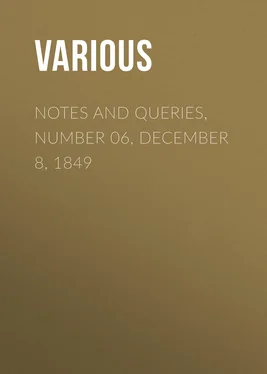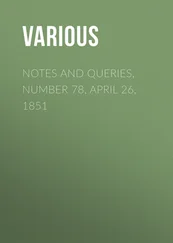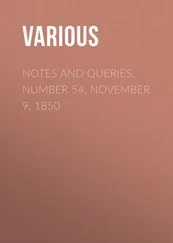Various - Notes and Queries, Number 06, December 8, 1849
Здесь есть возможность читать онлайн «Various - Notes and Queries, Number 06, December 8, 1849» — ознакомительный отрывок электронной книги совершенно бесплатно, а после прочтения отрывка купить полную версию. В некоторых случаях можно слушать аудио, скачать через торрент в формате fb2 и присутствует краткое содержание. Жанр: foreign_antique, periodic, foreign_edu, на английском языке. Описание произведения, (предисловие) а так же отзывы посетителей доступны на портале библиотеки ЛибКат.
- Название:Notes and Queries, Number 06, December 8, 1849
- Автор:
- Жанр:
- Год:неизвестен
- ISBN:нет данных
- Рейтинг книги:5 / 5. Голосов: 1
-
Избранное:Добавить в избранное
- Отзывы:
-
Ваша оценка:
- 100
- 1
- 2
- 3
- 4
- 5
Notes and Queries, Number 06, December 8, 1849: краткое содержание, описание и аннотация
Предлагаем к чтению аннотацию, описание, краткое содержание или предисловие (зависит от того, что написал сам автор книги «Notes and Queries, Number 06, December 8, 1849»). Если вы не нашли необходимую информацию о книге — напишите в комментариях, мы постараемся отыскать её.
Notes and Queries, Number 06, December 8, 1849 — читать онлайн ознакомительный отрывок
Ниже представлен текст книги, разбитый по страницам. Система сохранения места последней прочитанной страницы, позволяет с удобством читать онлайн бесплатно книгу «Notes and Queries, Number 06, December 8, 1849», без необходимости каждый раз заново искать на чём Вы остановились. Поставьте закладку, и сможете в любой момент перейти на страницу, на которой закончили чтение.
Интервал:
Закладка:
Various
Notes and Queries, Number 06, December 8, 1849
A FEW WORDS OF EXPLANATION
It was in no boastful or puffing spirit that, when thanking a correspondent in our last number for "his endeavour to enlarge our circulation," and requesting all our friends and correspondents "to follow PHILO'S example by bringing 'NOTES AND QUERIES' under the notice of such of their friends as take an interest in literary pursuits," we added "for it is obvious that they will extend the usefulness of our paper in proportion as they increase its circulation." We wished merely to state a plain obvious fact. Such must necessarily be the case, and our experience proves it to be so; for the number of Queries which have been solved in our columns, has gone on increasing in proportion to the gradual increase of our circulation;—a result which fully justifies that passage of our opening address which stated, "that we did not anticipate any holding back by those whose Notes were most worth having."
No sooner is information asked for through our medium, than a host of friendly pens are busied to supply it. From north, south, east, and west,—from quarters the most unlooked for, do we receive Notes and Illustrations of every subject which is mooted in our pages. Many of these replies, too, though subscribed only with an initial or a pseudonyme, we know to be furnished by scholars who have won the foremost rank in their respective branches of study. Such men manifest, by their willingness to afford information to those who need it, and their readiness to receive it from those who have it to bestow, the truthfulness of old Chaucer's portrait of the Scholar:—
"Ful gladly wolde he lerne, and gladly teche."
Nor do our columns exhibit the total result of our labours. Besides the information communicated to ourselves, some of our friends who inserted Queries under their own names, have received answers to them without our intervention.
In addition to those friends who promised us their assistance, we receive communications from quarters altogether unexpected. Our present number furnishes a striking instance of this, in the answer to Mr. Bruce's inquiry respecting the "Monmouth Ash," kindly communicated by the Earl of Shaftesbury, its distinguished owner.
We trust that each successive paper shows improvement in our arrangements, and proves also that our means of procuring answers to the Queries addressed to us are likewise increasing. In the belief that such is the case, we feel justified in repeating, even at the risk of being accused of putting in two words for ourselves under the semblance of one of our readers, "that it is obvious that our friends will extend the usefulness of our paper in proportion as they increase its circulation."
MONMOUTH'S ASH
Letter from the Earl of Shaftesburg accompanying a short "History of Monmouth Close," formerly printed by his Lordship for the information of persons visiting that spot.
The whole of Woodlands now belongs to me. The greater part of it was bought by my late brother soon after he came of age.
I knew nothing of Monmouth Close till the year 1787, when I was shooting on Horton Heath; the gamekeeper advised me to try for game in the inclosures called Shag's Heath, and took me to see Monmouth Close and the famous ash tree there.
I then anxiously inquired of the inhabitants of the neighbouring houses respecting the traditions concerning Monmouth Close and the celebrated ash tree, and what I then learnt I have printed for the information of any person who may visit that spot.
What I have since learnt convinces me that the Duke was not going to Christchurch. He was on his way to Bournemouth, where he expected to find a vessel. Monmouth Close is in the direct line from Woodyates to Bournemouth.
About sixty years ago there was hardly a house there. It was the leading place of all the smugglers of this neighborhood.
SHAFTESBURY.St. Giles's House, Nov. 27. 1849.
"The small inclosure which has been known by the name of MONMOUTH CLOSE ever since the capture of the Duke of Monmouth there, in July, 1685, is one of a cluster of small inclosures, five in number, which stood in the middle of Shag's Heath, and were called 'The Island.' They are in the parish of Woodlands.
"The tradition of the neighbourhood is this: viz. That after the defeat of the Duke of Monmouth at Sedgemoor, near Bridgewater, he rode, accompanied by Lord Grey, to Woodyates, where they quitted their horses; and the Duke having changed clothes with a peasant, endeavoured to make his way across the country to Christchurch. Being closely pursued, he made for the Island, and concealed himself in a ditch which was overgrown with fern and underwood. When his pursuers came up, an old woman gave information of his being in the Island, and of her having seen him filling his pocket with peas. The Island was immediately surrounded by soldiers, who passed the night there, and threatened to fire the neighbouring cotts. As they were going away, one of them espied the skirt of the Duke's coat, and seized him. The soldier no sooner knew him, than he burst into tears, and reproached himself for the unhappy discovery. The Duke when taken was quite exhausted with fatigue and hunger, having had no food since the battle but the peas which he had gathered in the field. The ash tree is still standing under which the Duke was apprehended, and is marked with the initials of many of his friends who afterwards visited the spot.
"The family of the woman who betrayed him were ever after holden in the greatest detestation, and are said to have fallen into decay, and to have never thriven afterwards. The house where she lived, which overlooked the spot, has since fallen down. It was with the greatest difficulty that any one could be made to inhabit it.
"The Duke was carried before Anthony Etterick, Esq., of Holt, a justice of the peace, who ordered him to London.
"His gold snuff box was afterwards found in the pea-field, full of gold pieces, and brought to Mrs. Uvedaile, of Horton. One of the finders had fifteen pounds for half the contents or value of it.
"Being asked what he would do if set at liberty,—the Duke answered, that if his horse and arms were restored, he only desired to ride through the army, and he defied them all to take him again."
DRAYTON'S POEMS
In addition to the notes on Drayton by Dr. Farmer, communicated in your 2nd number, the following occurs in a copy of Drayton's Poems , printed for Smithwicke, in 1610, 12mo.:—
"See the Return from Parnassus for a good character of Drayton.
"See an Epigram by Drayton, I suppose, prefixed to Morley's first Booke of Balletes .
"A Sonnet to John Davies , before his Holy Roode, or Christ's Crosse , 4to. (1610). A Poem in 6 line stanzas.
"Another to the old edit. of Wit's Commonwealth .
"Commendatory Verses before Chapman's Hesiod .
"Sonnet to Ant. Mundy's 2nd Book of Primation of Greece , 1619.
"His Heroical Epistles were newly enlarged and republished in 8vo. 1598; which is the most antient edition we have seen or read of.—[ Bodl. Cat. ]— Biographia his Art .
"Another edition, as we have heard , in 1610.— Ibid.
"See Merc's Wit's Treasury , p. 281. A modern edition was published by Oldmixon .—Cibber's Lives , 4. 204.
"See Warton's Essay on Pope , 296.
"Drayton's last Copy of Verses was prefixed to Sir John Beaumont's Poems , 1629."
So far Dr. Farmer, whose books are often valuable for the notes on the fly-leaves. Should any one act upon the suggestion of your correspondent, and think of a selection from Drayton, it would be necessary to collate the various editions of his poems, which, as they are numerous, evince his popularity with his contemporaries.
Читать дальшеИнтервал:
Закладка:
Похожие книги на «Notes and Queries, Number 06, December 8, 1849»
Представляем Вашему вниманию похожие книги на «Notes and Queries, Number 06, December 8, 1849» списком для выбора. Мы отобрали схожую по названию и смыслу литературу в надежде предоставить читателям больше вариантов отыскать новые, интересные, ещё непрочитанные произведения.
Обсуждение, отзывы о книге «Notes and Queries, Number 06, December 8, 1849» и просто собственные мнения читателей. Оставьте ваши комментарии, напишите, что Вы думаете о произведении, его смысле или главных героях. Укажите что конкретно понравилось, а что нет, и почему Вы так считаете.












